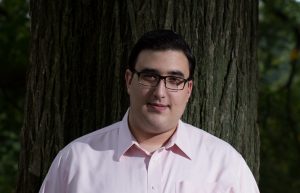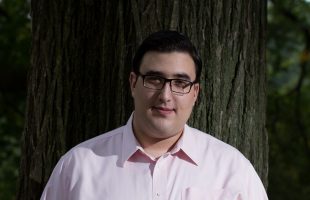We Too. Jewish Communal Culpability and Sexual Abuse
This week’s post is by Asher Lovy, a survivor and the director of community organizing for ZA’AKAH, an organization dedicated to advocating for survivors of child sexual abuse in the Orthodox Jewish community.
ZA’AKAH was founded in early 2012 to confront one very specific issue exemplified by one specific  event: We were founded by five former members of the Ultra-Orthodox community, some of whom were survivors of child sexual abuse, to stand outside the Internet Asifa (Gathering) and ask the community leaders and donors who spent the millions necessary for such an outsized event to officially ban the internet why they didn’t feel the need to spend even a fraction of that money on supporting survivors of child sexual abuse. Surely a community well-funded enough to rent out Citi Field for the sole purpose of something as asinine as banning the internet could similarly afford organizations and institutions to provide real support to the community’s countless survivors of sexual abuse, and absorb the liability created by decades of coverup.
event: We were founded by five former members of the Ultra-Orthodox community, some of whom were survivors of child sexual abuse, to stand outside the Internet Asifa (Gathering) and ask the community leaders and donors who spent the millions necessary for such an outsized event to officially ban the internet why they didn’t feel the need to spend even a fraction of that money on supporting survivors of child sexual abuse. Surely a community well-funded enough to rent out Citi Field for the sole purpose of something as asinine as banning the internet could similarly afford organizations and institutions to provide real support to the community’s countless survivors of sexual abuse, and absorb the liability created by decades of coverup.
Surely.
And yet, almost as if to punctuate our point, before our inaugural protest could take place outside the Asifa, the Satmar community of Williamsburg held a public fundraiser in support of an unlicensed therapist accused of raping his 12-year-old client for several years. This event was advertised throughout the Chassidic communities of Williamsburg and Boro Park and ended up raising $500,000 for their cause. The night before this event, we spotted a flier advertising it, and organized a protest outside the wedding hall where it was taking place. 150 people attended that protest, as well as many members of the press. From without and within the community came outrage at the fact that this fundraiser had taken place. And yet it had, sanctioned completely by Satmar’s leaders, and backed by many wealthy donors.
And still, not a single penny for survivors of child sexual abuse.
In his lead essay to Jewish Megatrends: Charting the Course of the American Jewish Community, Rabbi Sid Schwarz outlines what he believes to be the causes of the drop in Jewish identification and community participation among younger generations of American Jewry. He then sets forth four propositions by which that trend can be reversed. While the essay presents a very thorough reckoning with a very real problem, and its propositions bespeak a keen insight into the modern realities of Jewish identity among millennials (and by now members of Generation Z), it misses part of the problem that ZA’AKAH engages on a daily basis.
Most resonant with ZA’AKAH’s mission was the proposition that we, as a community, and by extension community leaders, must start focusing on and incorporating the causes of tzedek and social justice in the world which, in concert with the Jewish values we know inform such work. Most Jews look beyond the Jewish people and its internal tribal concerns for their values and engagement. If Jewish communal leadership did a better job addressing these wider, societal injustices, it would serve to excite the interest of these very Jews who have at least one foot well outside of our community.
While it is undoubtedly true that many younger Jews prefer to look beyond the narrow tribal interests of the Jewish people to causes that extend beyond its boundaries, there’s another component to that which the essay overlooks.
Among many younger Jews there is a growing disenchantment and disillusionment with the hypocrisy and practical failure to abide by the values preached by many leaders in the Jewish community. We preach about how God created all people in God’s own image, yet we ignore how certain Israeli policies might infringe on the rights of Palestinian people. We talk about loving our fellow Jew, and yet we turn a blind eye to rampant sexual harassment and abuse within our communities and institutions. We talk about justice, and yet do nothing about philanthropists in our community who wield their largesse as cudgels against any who would dare speak out against their abuses, or who use their money to coerce potential whistleblowers to keep quiet.
We see political and communal advocacy groups which, for decades, represented our communities in times of pressing emergency, turning now to support bigots and racists who profit from the hate they spread and throw just enough crumbs our way to make us grovel for more. We see a world inverted, where on Shabbat we hear one thing from the pulpit and on Monday, we see the opposite in practice.
So yes, the need to engage the social justice-oriented youth is clear and doing so will undoubtedly increase long-term engagement with the community. But, at its core, we must also reform our central institutions act in accordance with the values Rabbi Schwarz entreats them to represent.
When ZA’AKAH engages with members of various communities, primarily Orthodox but including people from across the spectrum of Judaism, one clear problem stands out. The people at the bottom, the ones suffering silently through horrific abuses, know what is wrong. The people around them know what is wrong. Even the people unaffected directly know what is wrong. They all know what must be done. They also know that one way or another, to varying degrees, they will suffer the consequences of raising their voices and speaking out against the communal leaders who perpetuate these injustices.
Our nonprofit space is rife with megadonors, philanthropists, board members, and well-respected leaders who have gotten away with either directly engaging in sexual harassment or abuse, or who have gotten away with looking the other away for the sake of keeping the money flowing.
That is why ZA’AKAH exists. Our mission is to educate the community about sexual abuse, educate them about how to prevent it and what their rights are if, God forbid, it happens. We advocate for their rights as survivors to be supported, to seek justice, and to live in communities where abuse will not be tolerated. In doing so, we give a voice to the silenced and hold accountable those people who, for far too long, have been shielded from responsibility by our entrenched institutional interests.
When we have built a community worth trusting; when we have leaders worth believing; and when we create and foster a culture where justice—not only for external causes but as an internal foundation of our religious and cultural institutions—and safety become our primary values, perhaps fewer young Jews will turn away from institutional Judaism, disgusted by what they experienced there.
[themify_hr color=”black” width=”100%”]
Asher Lovy is a survivor and the director of community organizing for ZA’AKAH, an organization dedicated to advocating for survivors of child sexual abuse in the Orthodox Jewish community. Having been actively involved in the fight to pass the Child Victims Act and Erin’s Law in New York, Asher is now pursuing a wider slate of legislation designed to protect children from sexual abuse and secure justice for survivors.


